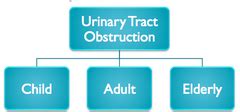
Urinary Blockage
Published Date: 6/17/2023 6:06:27 AM
Urinary blockage is a blockage of the flow of urine out of the body. The blockage slows or stops the flow of urine. The blockage of urine can put pressure on the bladder and then on the kidneys. The pressure can make it harder for the kidneys to do their job. Any part of the urinary tract may become blocked. This includes the:
- Kidneys, which make urine.
- Ureters, which are the tubes that carry urine from the kidneys to the bladder.
- The bladder, which stores urine.
- The urethra, which is the tube that drains urine from the bladder.
This problem is also called urinary obstruction.
Symptoms:
The symptoms depend on where the blockage is and how much it is stopping the flow of urine. Symptoms may include:
- Crampy pain, sometimes severe, in your belly, side, or back, but some types of blockage may not cause much pain.
- A strong need to urinate with trouble urinating.
- Blood in the urine
- Loss of bladder control
Cause:
There are many possible causes of urinary blockages, such as:
- Kidney stones
- Tumors and cancers of the urinary system, prostate gland, or female organs
- A narrowing of the urethra (urethral stricture) in men caused by scar tissue from previous infections or surgical procedures
- In older adult men, a prostate gland that has gotten bigger and is putting pressure on the urethra (benign prostatic hypertrophy)
Probable Cause:
Fear. Repressed emotions. Stifled creativity.
New thought pattern:
My good now flows freely. Divine ideas expressed through me. I am at peace.
Treatment:
- The treatment for urinary blockage depends on its cause and location. The goal is to get the urine flowing normally again. This will relieve pain and prevent damage to the kidneys and urinary tract.
- If the blockage is between a kidney and the bladder (like a kidney stone), your healthcare provider may put a drainage tube called a stent in the ureter to drain urine from the kidney until further treatment relieves the blockage.
- If the blockage is between the bladder and the place where urine leaves your body, your provider may put a catheter into the urethra to drain urine from the bladder. A catheter is a thin, hollow, flexible tube. The catheter is usually left in place for at least a couple of days to keep the problem from happening again. It also allows the bladder to return to normal after having been stretched out from holding more than the normal amount of urine because of the blockage.
- If the blockage is caused by a medicine you are taking, your provider may recommend that you stop taking the medicine or change your medicine.
Follow your healthcare provider's instructions. Ask your provider:
- How and when you will hear your test results.
- How long it will take to recover.
- What activities you should avoid and when you can return to your normal activities.
- How to take care of yourself at home.
- What symptoms or problems you should watch for and what to do if you have them.
Make sure you know when you should come back for a checkup.
Prevention:
- Some causes of urinary blockage cannot be prevented. You may be able to help prevent kidney stones by getting treatment for any health problems that may be causing kidney stones, changing your diet, and drinking plenty of water to keep your urine dilute.